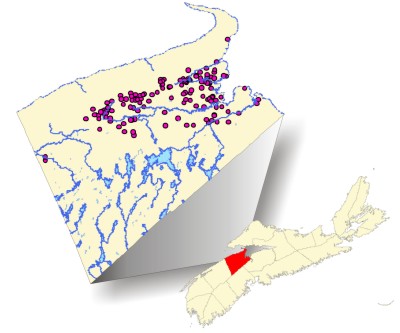The Well Water Nitrate Monitoring Program is a long-term study that involves yearly testing for nitrate at approximately 150 water wells in Kings County, which is one of the most intensively farmed areas of the province. The study area and locations of the water wells are shown in Figure 1 below.
Nitrate is a substance that can occur in well water from natural sources and from human activity. High nitrates in well water are often caused by septic fields, manure piles or fertilizers. The Canadian Drinking Water Quality guideline for nitrate (as nitrogen) is 10 mg/L. Nitrate levels greater than 10 mg/L may contribute to a condition known as methaemoglobinaemia (Blue Baby Syndrome) in infants six months and younger. In addition, elevated nitrate levels in groundwater may indicate that other water quality problems exist. Nitrates can be removed with water treatment, but it is preferable to resolve the problem by either removing the contamination source or by improving the well construction.
The Well Water Nitrate Monitoring Program is a follow-up to water quality studies that took place in 1989, 1999 and 2000. When the study first began in 1989, water wells were tested for a variety of contaminants, including nitrate, general chemistry, bacteria and pesticides. The monitoring program has since been refined to focus on nitrate because the results of the initial study indicated that nitrate was the parameter that most commonly exceeded guidelines.
Reports
- Well Water Nitrate Monitoring Program - 2012 Report
 (PDF:288k)
(PDF:288k) - Well Water Nitrate Monitoring Program - 2011 Report
 (PDF:807k)
(PDF:807k) - Well Water Nitrate Monitoring Program - 2010 Report
 (PDF:461k)
(PDF:461k) - Well Water Nitrate Monitoring Program - 2009 Report
 (PDF:302k)
(PDF:302k) - Well Water Nitrate Monitoring Program - 2008 Report
 (PDF:501k)
(PDF:501k) - Nova Scotia Farm Well Water Quality Assurance Study - 1994 Report
 (PDF:3.1mb)
(PDF:3.1mb)

Well Water Nitrate Monitoring Program - well locations

